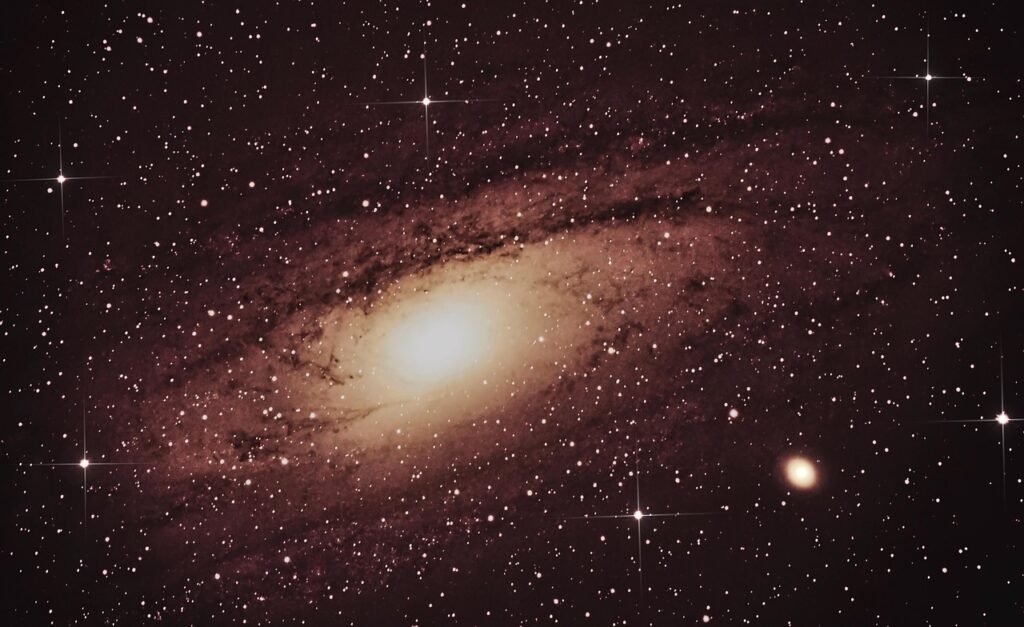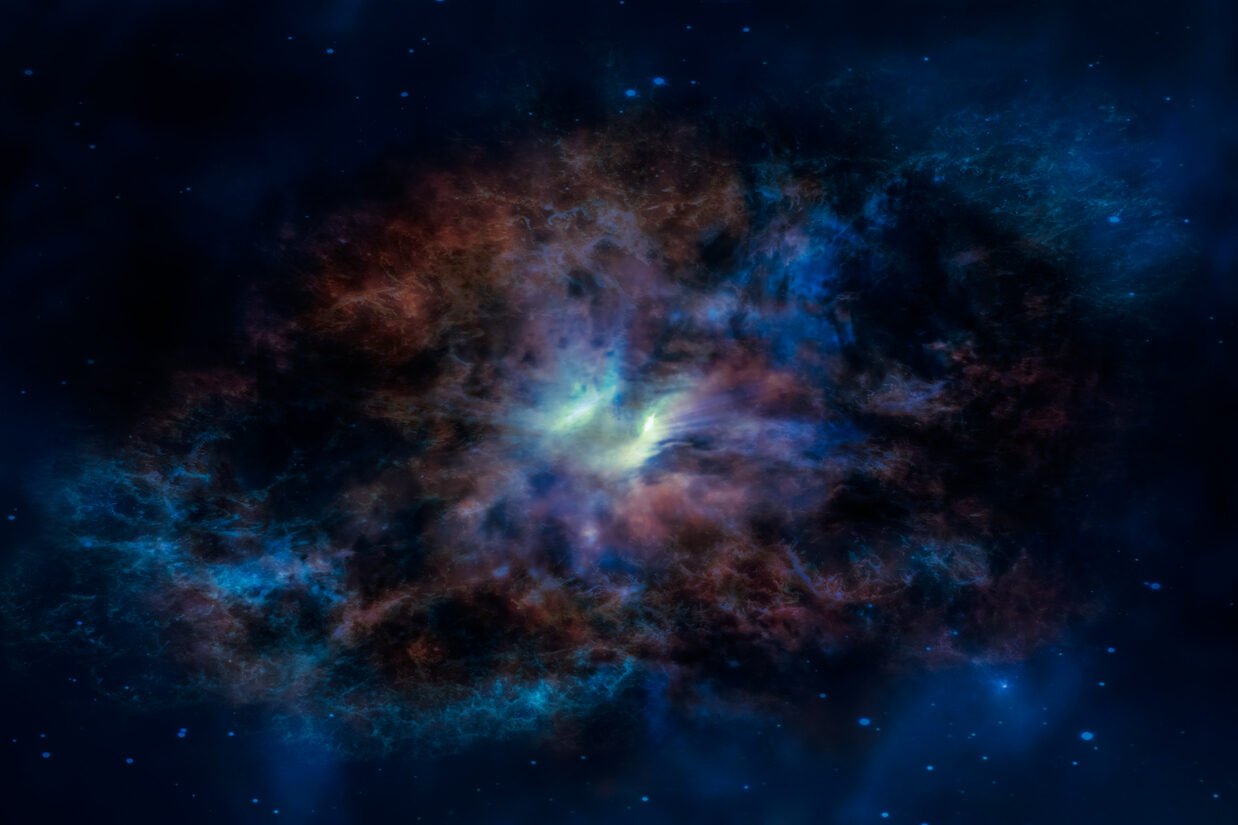Scientists Just Shortened the Universe’s Lifespan—By Billions of Years

Ever planned your entire weekend only to have your boss announce overtime at the last minute? Well, cosmologists just experienced something similar, but instead of losing a Saturday, they lost billions of years. A groundbreaking new theory suggests that dark energy—the mysterious force stretching the universe apart—could rip reality itself apart much sooner than anyone imagined. Previously, the universe was expected to coast comfortably along for trillions of years, expanding leisurely like a sleepy Sunday morning. Now, physicists are facing an unsettling possibility: the universe might hit the cosmic “stop” button shockingly early, abruptly ending everything we know.
Imagine space itself suddenly stretching so fast that galaxies, stars, and even atoms get torn apart. This grim scenario is poetically named the “Big Rip,” and yes—it’s as brutal as it sounds. Under the new theory, the universe doesn’t fade gracefully; it explodes violently, leaving nothing behind but emptiness. It’s as if the universe scheduled an early retirement without telling anyone, catching physicists totally off guard. Understandably, astronomers worldwide are frantically checking their calculations, hoping they’ve misplaced a decimal point somewhere. Because if they’re right, humanity’s long-term cosmic forecast just shifted from endless possibilities to “enjoy it while it lasts.”
Dark Energy Got an Upgrade—and It’s Terrifying
You know those software updates that suddenly change everything on your phone? Cosmologists just received the mother of all updates about dark energy—and it’s way scarier than a surprise UI change. Until recently, scientists considered dark energy as a gentle, consistent push, steadily expanding the universe at a manageable pace. Now, they’re staring in horror at calculations indicating dark energy might actually be intensifying rapidly, growing stronger over time. Imagine pushing a stalled car downhill, only to realize it’s speeding up uncontrollably—headed straight toward disaster.
This terrifying discovery means the universe’s expansion could dramatically accelerate, ripping galaxies apart in a fraction of the time once predicted. The scenario quickly goes from peaceful cosmic drifting to a violent cosmic car crash. Planets, stars, and eventually entire galaxies would simply unravel as space itself expands faster than gravity can hold things together. If this feels like a bad sci-fi plot, welcome to cosmologists’ new reality: frantic recalculations, tense debates, and sleepless nights trying to grasp dark energy’s frightening upgrade. Just when humanity felt secure about our place in the cosmos, the universe threw a curveball, reminding us who’s really in charge.
How a Single Equation Shattered Our Cosmic Timeline
Imagine doing your math homework and accidentally discovering the apocalypse—sounds ridiculous, right? Yet that’s exactly what happened when physicists re-examined a crucial equation describing dark energy. They tweaked a seemingly innocent parameter, and boom—suddenly the universe had an expiration date billions of years earlier than previously thought. It was like adjusting your GPS for a quicker route, only to realize you’ve driven off a cliff. The unsettling thing is, the math checks out perfectly, leaving researchers baffled and seriously uncomfortable.
Before this discovery, scientists believed we had nearly infinite cosmic time ahead. Galaxies would drift lazily apart over countless eons, giving life endless opportunities to flourish. Now, with one small mathematical adjustment, that leisurely future vanished in an instant. The universe’s revised timeline is shorter, colder, and alarmingly bleak, making humanity’s presence feel like an insignificant flicker rather than a meaningful chapter. Cosmologists worldwide are still reeling from this mathematical revelation, desperately rechecking numbers and hoping for errors. But every calculation stubbornly confirms the same truth: the universe’s clock is ticking way faster than anyone expected.
Welcome to the Era of “Cosmic Anxiety”
If you’ve ever felt anxious waiting for important news, imagine the collective anxiety of astronomers who just learned their entire universe might vanish ahead of schedule. Thanks to this unsettling new theory, the cosmic community is experiencing a phenomenon dubbed “cosmic anxiety,” a pervasive sense of dread that our universe could abruptly end billions of years sooner than anticipated. Physicists previously treated the distant future as comfortably secure; now they’re nervously recalculating, double-checking telescopes, and quietly freaking out over cups of coffee. And can you blame them? They just learned their entire scientific foundation might be built on cosmic quicksand.
This cosmic anxiety stems from uncertainty about how quickly dark energy will tear reality apart. Scientists liken the situation to sitting in a car with the accelerator stuck, unable to know exactly when you’ll crash—but knowing it’ll be soon. Universities and research institutes are buzzing with tense debates about what this accelerated timeline means for humanity’s future. The pressure is tangible as researchers grapple with potentially losing billions of years of cosmic history overnight. Suddenly, distant astronomical projects feel more urgent, and our existence seems shockingly fragile. Welcome to the anxiety-inducing world where even the universe itself isn’t guaranteed.
Could Dark Energy Turn Off Like a Cosmic Switch?

Just when physicists thought dark energy couldn’t get weirder, a theory emerged suggesting it might abruptly vanish—turning off suddenly, like someone unplugging the universe. If that sounds unsettling, that’s because it is. Imagine gravity suddenly reclaiming control, instantly reversing cosmic expansion and pulling everything back together. This wouldn’t be a gentle slowdown—it’d be a violent implosion called the “Big Crunch,” literally squeezing the universe into oblivion.
Scientists originally believed dark energy was constant, providing a predictable, gentle push outward. But recent data suggest dark energy might fluctuate unpredictably, suddenly diminishing or disappearing altogether. This terrifying scenario leaves physicists scrambling to understand the cosmic equivalent of a malfunctioning engine, capable of stalling without warning. If dark energy turns off suddenly, galaxies, stars, and planets would rush toward each other, crashing spectacularly in an astronomical catastrophe. It’s a chilling reminder that even the most stable cosmic forces can surprise us dramatically. Scientists now nervously watch their instruments, hoping the cosmic plug stays firmly in place.
Is Dark Energy Secretly Unstable?
We’ve all met someone who seems stable until they suddenly snap—could dark energy be the cosmic version of that unpredictable friend? New research suggests dark energy might harbor hidden instability, quietly building tension until it triggers a violent cosmic catastrophe. Instead of expanding steadily forever, the universe might experience sudden, catastrophic acceleration, rapidly tearing everything apart in a spectacular finale. Imagine pulling gently on a rubber band that unexpectedly snaps, painfully and violently—that’s the new nightmare scenario for cosmologists.
This hidden instability theory gained traction after astronomers observed unexpected patterns in distant galaxies, patterns hinting at a cosmic “breaking point.” Scientists now worry dark energy might behave unpredictably, quietly accumulating pressure before explosively accelerating cosmic expansion. Galaxies and stars could literally shred apart overnight, leaving astronomers no warning or chance to prepare. The universe would vanish violently, leaving nothing behind but empty, expanding darkness. Physicists are now anxiously monitoring galaxies, desperately seeking signs of instability—and praying their cosmic rubber band remains intact.
Dark Energy Might Be Stealing Time From Our Universe
Ever feel like time is speeding up as you get older? Well, the universe might be experiencing the cosmic equivalent, thanks to dark energy. This wild theory suggests dark energy might be effectively stealing cosmic time, accelerating the universe’s expansion at such breakneck speeds that it prematurely ends existence itself. The idea seems bizarre, yet recent measurements indicate distant galaxies are racing apart faster than ever, as if dark energy’s pushing the cosmic fast-forward button.
Physicists joke darkly about dark energy robbing the universe’s retirement fund, spending its future recklessly fast. Galaxies could unravel, stars could scatter, and even atoms themselves might stretch apart, erasing everything billions of years early. The thought of time itself being depleted by a mysterious cosmic force sounds surreal, yet it matches increasingly troubling astronomical data. Scientists worldwide now grapple with a disturbing reality: we might have dramatically less cosmic time left than ever imagined. It’s the ultimate countdown clock, hidden ominously in plain sight.
When Reality Itself Starts Unraveling
Have you ever watched a knitted sweater unravel thread by thread, helplessly unable to stop it? Scientists are facing an equally disturbing scenario, thanks to dark energy’s newfound intensity. According to this unsettling theory, the fabric of reality itself might literally begin to pull apart, tearing galaxies, solar systems, and even atoms into scattered fragments. Imagine waking up to find stars suddenly vanishing from the sky, planets spiraling into darkness, and everything around you dissolving into chaos—it’s like witnessing a nightmare become real.
Physicists nervously call this scenario the “Big Rip,” a name both frighteningly accurate and incredibly descriptive. Atoms themselves wouldn’t hold together; even subatomic particles would scatter, leaving nothing but isolated energy dispersed across a cold, empty void. Researchers previously imagined this event trillions of years in the future, comfortably far off. Now, however, new calculations suggest reality’s unraveling could begin billions of years sooner than expected. If dark energy’s acceleration continues unchecked, the universe’s expiration date looms ominously close—turning cosmologists into anxious cosmic weathermen, desperately hoping their forecasts are wrong.
What If We’re Wrong About Everything?

Ever confidently told friends you knew the answer—then realized mid-sentence you were totally wrong? Physicists just experienced that exact feeling, but instead of trivia night embarrassment, they might have misunderstood the entire universe. The unsettling new theory about dark energy suggests our fundamental assumptions—like how space expands and why—could be drastically mistaken. Instead of steadily pushing galaxies apart at a predictable rate, dark energy might accelerate expansion unpredictably, dramatically shortening the universe’s life expectancy and invalidating decades of scientific understanding.
If true, this doesn’t just tweak cosmology—it turns the whole field upside-down, forcing scientists to rethink every textbook, lecture, and cosmic law they’ve confidently taught for generations. It’s like discovering gravity occasionally reverses or that math sometimes equals apples: nothing makes sense anymore. The shockwaves of this revelation are rippling through universities, research labs, and astronomy observatories worldwide, prompting existential crises among scientists who dedicated careers to cosmic stability. And yet, amidst the chaos, there’s excitement too—because if we’ve misunderstood something this fundamental, what else might we discover tomorrow? One thing’s clear: the universe still has countless secrets hidden, and dark energy just proved we haven’t even scratched the surface.
